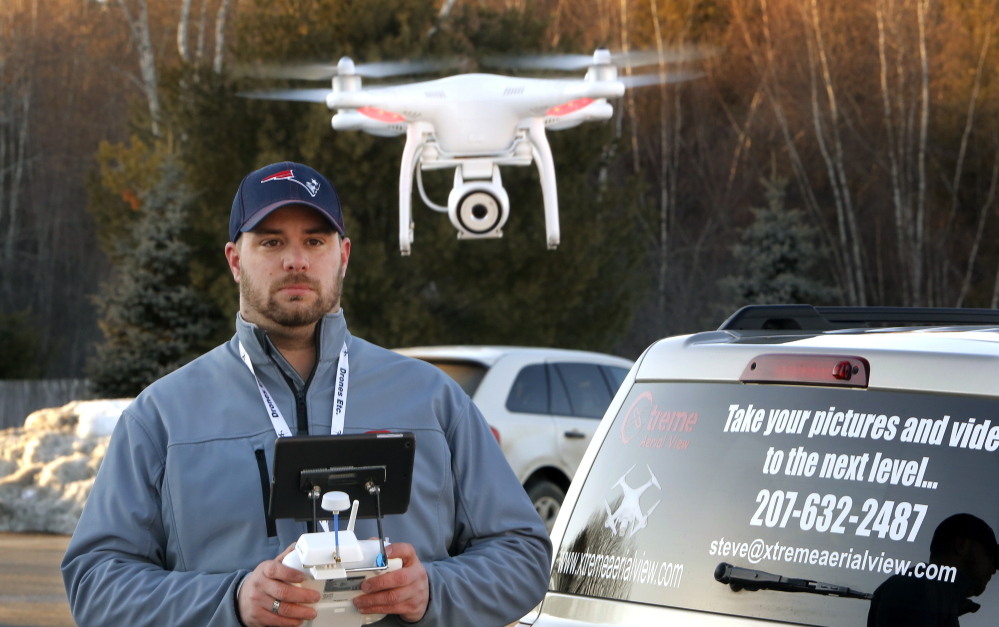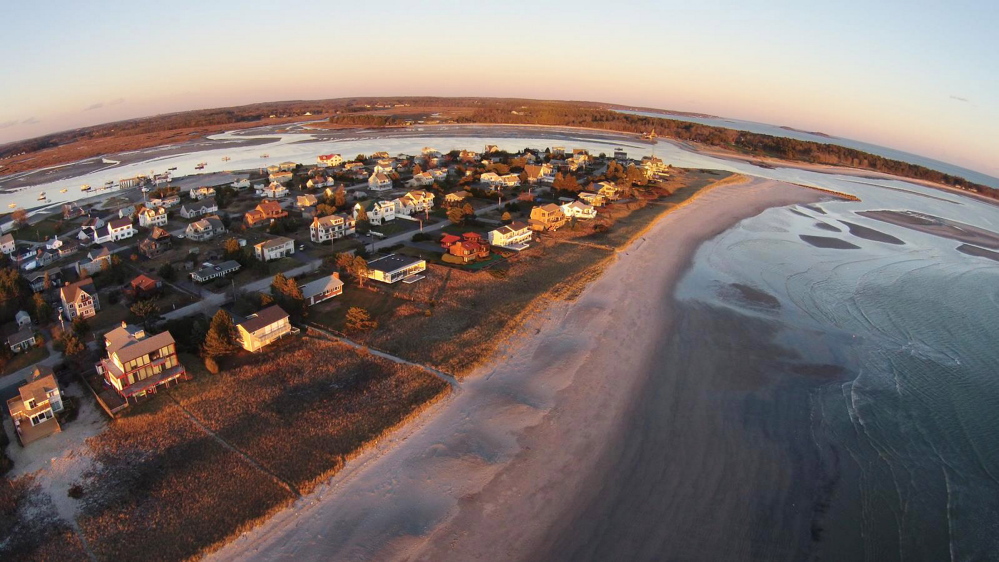Steve Girard of Gorham has a full-time job, but he hoped to make a little extra cash by turning a hobby – flying his drone quadcopter – into a side gig taking aerial pictures.
He practiced flying the modified, 3-pound DJI Phantom two for months after he got it last year, using the remote controls by hand at first and then programming GPS flight patterns so he could focus more attention on pictures and videos than on flying and hovering.
But when he finally got good enough to advertise his aerial photography services on his website, the Federal Aviation Administration quickly stepped in last week in an attempt to shut him down, a move that legal experts say oversteps the agency’s authority.
Bobby Reed, the manager of the FAA’s Flight Standards District Office in Portland, left Girard an ominous voice mail on March 3.
“We’re looking at your website, and an investigator will be in touch with you regarding the limitations which you may be exceeding in regard to advertising drones and aerial footage,” Reed said. “They’ll be looking for you to pull down the website. … There are serious implications, and there are fines and penalties associated with this activity.”
Legal experts, however, say Reed’s message went beyond the FAA’s authority, and demanding that Girard remove his website could be a violation of his First Amendment right to free speech.
Flying drones, or unmanned aircraft systems, as the FAA refers to them, is a legal gray area, and the technology may be outpacing the government’s ability to regulate it.
Federal legislation in 2012 authorized the FAA to establish regulations for flying drones commercially, but it took the agency until last month to propose a set of rules. It will begin holding meetings on the proposal after the 60-day public comment period ends on April 24 and it could be more than a year before any regulations are approved.
Until then, the FAA’s ability to regulate drones is limited to making sure they don’t pose a hazard.
“To force him to take down his website was a complete overreach,” said Justin Silverman, executive director of the New England First Amendment Coalition. “This seems like something the FAA really shouldn’t be involved in.”
Silverman, a Massachusetts attorney, said that when the FAA regulations on drones are approved, they should pertain to the use of drones, not the advertising of their use.
Girard didn’t know that when he listened to Reed’s voice mail, and he immediately called the FAA back to try to comply.
“I took all of the prices off my website. I called them up and said, ‘This is not a commercial website anymore,'” Girard said. “They keep calling back every five minutes.”
Jim Peters, a spokesman for the FAA’s Eastern Region, said in an email that the FAA will not allow any drone operation that poses a hazard to other aircraft or people and property on the ground.
“FAA authorizes UAS operations not for hobby or recreation on a case-by-case basis,” Peters said.
Peters added that the FAA requires commercial users to obtain a pilot’s license or a license exemption with a Certificate of Waiver or Authorization. He acknowledged, however, the FAA had no grounds to order Girard to take down his website.
“The FAA’s goal is to promote voluntary compliance by educating individual UAS operators about how they can operate safely under current regulations and laws. The FAA’s guidance calls for inspectors to notify someone with a letter and then follow up. The guidance does not include language about advertising. The FAA will look into the matter,” Peters said.
‘A WHOLE MESS OF ISSUES’
Before Girard was supposed to meet with the FAA at its Portland office, he posted a recording of Reed’s voice mail on a Facebook group devoted to drone law. That post on “UAV Legal News & Discussion” board drew nearly 250 comments from drone users offering Girard advice about what to do.
Mike Fortin, owner of CineDrones, a Florida-based aerial drone company that does professional film and television work, was one of the first people to reach out to Girard.
“When I heard about it, I thought it was a gag. There is no way they can be telling this guy to take down his website. That’s his right as an American,” Fortin said. “I said, ‘Listen, man, these guys are not your friends.’ I don’t want to put a black cloud over the FAA. They have a job to do, and their job in their eyes is to go after people like Steve and myself who use drones for a good use.”
Fortin has experience dealing with the FAA during the two years he has built up his company, which has more than five employees and uses equipment worth more than $100,000 for its aerial productions. He spoke by phone from San Diego as he was loading a van after a shoot for a TV commercial to head to Los Angeles, where he hopes to open a second business location.
“The one huge misconception out there is that what the FAA says is law. It’s not law,” Fortin said. “They are not a law enforcement agency. It’s really created a whole mess of issues and misinformation.”
Peter Sachs, a Connecticut attorney who founded the Drone Pilots Association, also offered advice to Girard on Facebook that the FAA’s regulations have not been approved.
“Until the proposed rules become final, there really is no law whatsoever in regard to commercial regulations,” said Sachs, who added that he makes no money advising clients on drone laws but follows it as a hobby.
Sachs believes FAA inspectors should devote their limited resources to safety issues, rather than making calls and sending letters to threaten people who use drones for photography or videos.
“It’s a very silly focus right now unless something presents a clear danger,” Sachs said by phone Friday. “It’s a silly waste of time. They have better things to do, especially since there is no basis of law to back them up.”
Reed, reached at his Portland office, said he’s seen drone videos posted on social media sites that were clearly recorded in the flight paths of jets coming to and from Portland International Jetport.
He said the FAA is doing its best to educate operators about its guidelines for drones used for commercial applications.
“We’re not out driving the road looking for quadcopters because you don’t have to do that,” Reed said. “They’re on YouTube, Facebook.”
An attorney for the city of Portland, associate corporation counsel Michael Goldman, said the FAA has reached out to the city several times offering to make presentations to officials about drone use.
“The city at this point hasn’t taken any action in response to these,” Goldman said. “When the rules become finalized, we’ll have to look at them when that happens. But in the meantime, we are waiting to find out what the law is.”
FAA NO LONGER CALLING
As for Girard, he ultimately decided not to attend his scheduled appointment with the FAA. Since he posted the recording of Reed’s voice mail message, the FAA has stopped calling him.
Even after all the online feedback, Girard is concerned he could be in trouble with the FAA, although he remains enthusiastic about commercial aerial photography. A Swiss native who moved to the United States in 2005 and became a citizen in 2012, he feels he has a lot to lose. He has a good job at U.S. Cellular, a longtime girlfriend and a 7-year-old daughter, and his mother recently moved here from Switzerland to be closer to his daughter.
His website, www.xtremeaerialview.com, is still up, showing his pictures and videos. But there are no prices.
“I’m all about following the rules. Just give me something to follow,” Girard said. “I think I didn’t do anything wrong.”
Send questions/comments to the editors.




Comments are no longer available on this story